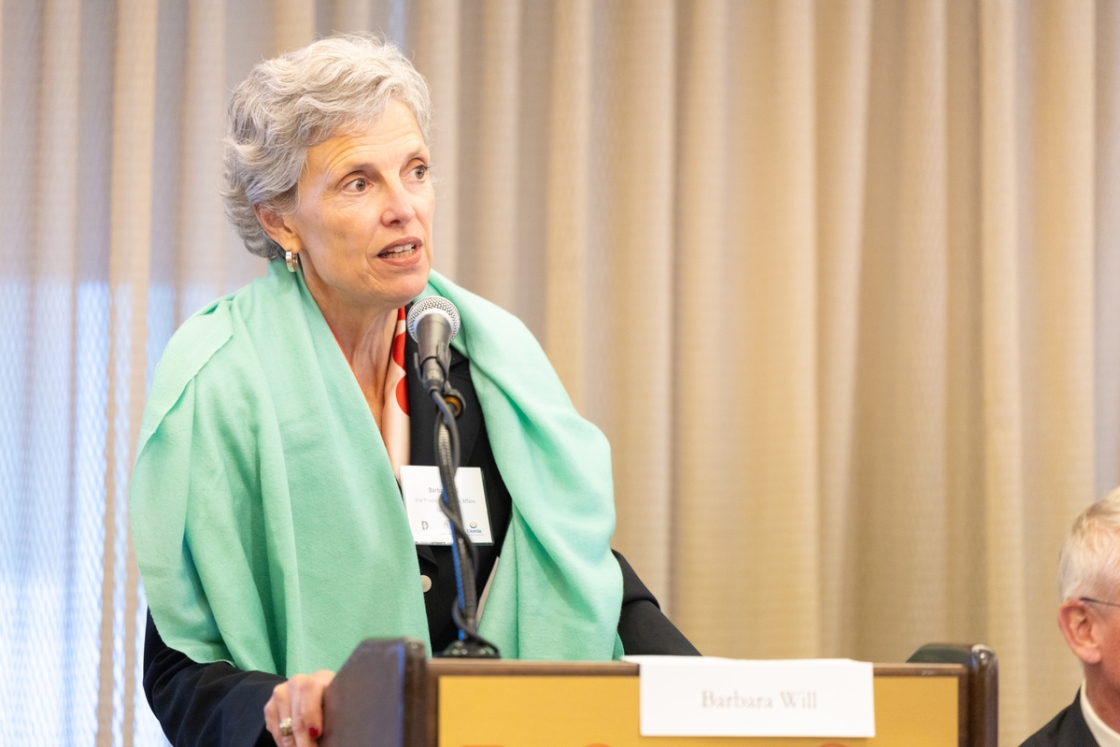Ansley Booker has joined Dartmouth as the inaugural Penny and Jim Coulter 1982 Executive Director of Dartmouth NEXT, a university-wide initiative aimed at expanding opportunities for students in science, technology, engineering, and mathematics.
Dartmouth NEXT was launched with a historic $100 million goal to diversify the STEM pipeline by creating opportunities for students to pursue careers in the sciences. The heart of that effort includes a $25 million gift from Penny and Jim Coulter ’82 to endow the executive directorship and to establish the Coulter Scholars program, which is welcoming its first cohort to campus this fall. The initiative has already raised more than $60 million toward the goal.
“The most urgent challenges facing the world today require increasing the numbers of people who enter STEM fields. It’s what the National Science Foundation has called ‘the missing millions,’ who are needed more than ever to fill jobs and take leadership roles in science-driven careers,” says President Sian Leah Beilock, a founder and leader of the EDGE Consortium, a coalition of women-led universities and engineering schools seeking to double the number of industry-ready trained individuals, with a focus on women and underrepresented individuals, entering the semiconductor industry.
“I am delighted to welcome Dr. Booker to campus to lead Dartmouth NEXT and help create opportunities in the sciences for everyone and maximize our impact.”
Booker most recently served as the inaugural director of diversity and inclusion initiatives at Mercer University. She holds a PhD in educational leadership from Mercer, a master’s of science in pharmacy from the University of Georgia, and a bachelor’s degree from Georgia Southern University, where she majored in biology with a minor in chemistry and was a Ronald E. McNair Scholar. She arrived in Hanover in August and has been actively reaching out to colleagues and partners across campus.
“Ansley is a visionary catalyst for change,” says Dean Madden, vice provost for research. “She brings a STEM background, and she understands leadership and how to take an inclusive and collaborative approach to engaging many different communities to generate opportunities for all students. Most importantly, she’s a champion for students. For Ansley, students are at the center of everything.”
The new executive director reports to Madden and to Shontay Delalue, the senior vice president and senior diversity officer. The pair co-chaired the national search for the position.
As executive director of Dartmouth NEXT, Booker will serve as a strategic partner, thought leader, and advocate for diversity in STEM, partnering with Dartmouth’s nationally distinctive initiatives—including the Women in Science Project, the E.E. Just Program, Dartmouth Emerging Engineers, the Teaching Science Fellows—to develop a university-wide strategy to increase opportunities for the broadest range of students to have exceptional STEM experiences.
“I am ecstatic about this position because while it is an inaugural role at Dartmouth, it builds on a 30-year legacy of empowering and equipping world-class students in STEM disciplines,” says Booker. “Dartmouth has the intellectual capital, human ability, and inclusive leadership to position us to be a leader in developing the next generation of STEM leaders poised to accelerate the future.”
Booker describes herself as “a byproduct of a rural education system that sought to encourage underrepresented groups in STEM disciplines”—an experience that drives her commitment “to developing a legacy where all individuals have the opportunity to succeed and thrive,” she says.
Booker says she plans to bring “a spirit of collaboration” to the work of “fostering a culture of open communication, free exchange of ideas, and establishment of common goals and aims” with partners on campus and off.
“I believe it is crucial to be invested in the infrastructure of your surrounding community, state, regional, national, and international landscape,” she says. “Often, these partnerships produce invaluable resources, networks, and talent pipelines that lead to a collective positive impact.”
“We are pleased to welcome Dr. Booker to the Dartmouth community and the NEXT program, both of which will benefit from her experience and leadership in creating new pathways for opportunities in STEM,” say Jim and Penny Coulter. “The need for STEM expertise couldn’t be greater, but the barriers to entry remain stubbornly high. Dartmouth has a long and successful history in expanding representation in the STEM disciplines, and we are proud that the institution, through Dartmouth NEXT, is building on that legacy.”
Booker helped launch Mercer’s Office of Diversity and Inclusion in 2019, leading the implementation of the university’s strategic vision for diversity and inclusion and developing partnerships with students, faculty, staff, and administrators throughout the university and with stakeholders beyond campus. In 2022, she received the Barry Jenkins Award for Outstanding Contributions to Student Life for her engagement with the campus community.
While at Mercer, she was adjunct faculty at the Stetson-Hatcher School of Business, the Tift College of Education, and the College of Professional Advancement. At Mercer University School of Medicine she was an assistant professor/volunteer faculty in the department of bioethics and medical humanities and worked closely with the diversity and inclusion team. She also served as a mentor to first-generation STEM students in the Mercer Firsts Program and as faculty of the university’s Upward Bound program, facilitating biology and chemistry instruction for high school students.
Previously, she was site coordinator and director of the Federal TRIO Program at Mercer’s Educational Opportunity Center, which provides post-secondary education, training information, and application assistance to low-income first-generation adults. She also served as faculty advisor for Envision EMI, LLC, advising high school and college students across the country on college access and health care pathways.
Among her many service roles, Booker was co-membership chair of the Central Georgia Empowerment Fund, diversity and inclusion representative to Boy Scouts of America Central Georgia Council, a member of the Henry County (Georgia) Chamber of Commerce DEI committee, and a grant reviewer for the Howard Hughes Medical Institute Driving Change Initiative.
She was a board member and faculty of the Macon, Ga.,-based Real I.M.P.A.C.T Center Inc., developing curriculum and mentoring girls primary and middle school-aged girls interested in STEM careers, and board member and community liaison of Storytellers Macon, a nonprofit community-based storytelling organization. She was also a past president of the Career Women’s Network of Macon and received the Association of Junior Leagues International’s inaugural 40 Under 40 Award.
She has published and presented extensively on the experiences of African American/Black women and other students historically excluded and underrepresented from STEM education and student affairs, including a TEDx talk, Unhidden Figures: Uncovering Our Cultural Biases in STEM.

